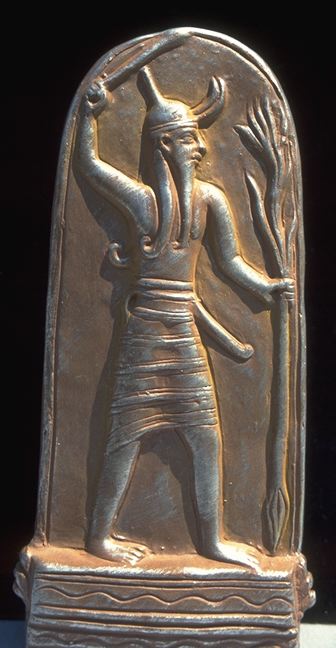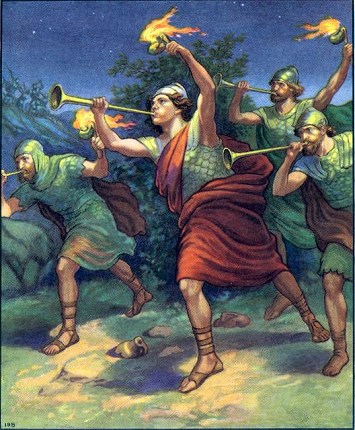In those days Israel had no king; everyone did as he saw fit. (Judges 21:25)
The Judges -- The Origianl Superheros
Gideon lived during a time in Isreal's history shortly after they escaped from Egypt into the land that God had promised to take them to. After Moses took them to the land, Joshua took over and led the people in taking and settling the land. After Joshua died, the Israelites were left pretty much without a leader, but there were still many nations around them that wanted to take advantage of them, and with no leader they were pretty helpless. God's solution to this situation was the judges. The judges were like temporary leaders who God raised up from among the people to pull the people together enough to fight off whatever enemies were currently threatening Israel. The judges also helped the people of Israel to know better how to serve God, and would hold them accountable to doing so. They had no official authority--people would rally to them when they saw God working in them. When a judge would come, God would use them to defeat the enemy and draw God's people back to him, them when a judge would die the people would start to fall back to their sins.

Gideon was one of these judges, and God empowered him to deliver Israel from Midian. God had sent the Midianites against Israel as a wakeup call, to let Israel know He wasn't pleased with how they were acting (see Judges 6:1-6; they had been worshipping idols, particularly Baal and Ashera, a god and goddess of fertility and agriculture from what I understand). Midian starts to terrorize Israel, coming mainly around harvest time to steal the food that Israel planted and worked for. After seven years, the people of Israel cry out to God for help, and God prepares Gideon for the job. First, God had Gideon tear down his town Baal altar and its Ashera pole, replace them with a real altar, and sacrifice a bull on it to God. This establishes Gideon as a servant of the LORD and a judge in the eyes of the people (and earns him a sweet nickname, Jerub-baal, "let Baal contend with him").

Next, God has Gideon get an army together. The army starts out as 32,000 men, but God has Gideon dismiss those who are either afraid or drink funny, bringing the number down to 300. With these men, Gideon sneaks down to the Midian camp at night. They surround the Midianites, then all at once break jars, wave torches, and blow trumpets. The Midianite army wakes up too scared to think straight--they kill most of each other, then run away. After this, Gideon is pretty popular among the Israelites (understandably), so they ask him to be their king. Gideon turns it down (we find out later that God never wanted Israel to have a king), telling them neither he nor his sons will ever be kings over them.
Zero to Hero

One of the most notable things about Gideon's life is the way that God calls him. Take a look at Judges 6:11-16. It starts with God sending and angel with a message to Gideon. Gideon is threshing wheat--but not in the normal way. To thresh wheat, you throw it up in the air and let the wind blow away the chaff, which is lighter, so that only the kernels of wheat, which are heavier, fall back down. Out of fear of the Midianites, Gideon was hiding in a winepress while doing this, which would severely cut down on the wind available. We can often be put into similar situations, doing things that don't work very well because we fear the consequences of doing them the right way. While Gideon is doing this, God gives him this message:
The LORD is with you, O mighty man of valor. What's so interesting about this that there is no reason for God to call Gideon a "might man of valor." He hasn't done anything yet. So far, Gideon's role has been one consisting entirely of hiding from the Midianites. When he hears this, Gideon has trouble believing it, asking 'How can you say God is with us, when Midian is totally dominating us? Isn't this the same God that our fathers told us brought them out of Egpyt and did all sorts of miracles? That God has abandoned us.' God tells Gideon, 'I have not abandoned you or your people. And I will be with
you as you lead an attack against Midian.' Even though Gideon was living in fear and blaming his tough times on God for not helping him, God came to him and told him that He would use him to work His will on earth. God tells him "Go in this might of yours" even though Gideon knows he is the weakest man in a weak clan (see Judges 6:15). So what might is God talking about? What valor is God talking about? The might and valor that come from the very first statement made to Gideon:
The LORD is with you, O mighty man of valor.
When Gideon had no might (he was weakest of the weak) or valor (fear had him threshing wheat in a winepress) of his own, God took him aside and spoke a word into his life: I declare you to be a mighty man of valor. This is not a word of recognition for what Gideon has done--he hasn't done anything yet. We would expect this statement to come from God
after Gideon defeats Midian, not before. But God can and does speak it before Gideon has earned it.
Fireproof
This comes to the core of the story of Gideons life. When a person reads this story, and sees the way that Gideon lived his life, it makes us ask, "How can I live a life like that?" And as we look, we see the key lies in God's word that He spoke to Gideon that changed his life: The LORD is with you, mighty man of valor. To live like Gideon, we need that same might and valor spoken into our lives. So how does that work? The Bible tells us it rests on being told "The LORD is with you." The life of a person that destorys idols and leads a nation depends on the the LORD declaring His prescence in their life. This is where this Old Testament story brings us: we need the LORD to declare his prescence in our lives if we are ever to really live. Reading about Gideon makes us ask, "How can I have the LORD declare that of my life? To say to me, 'The LORD is with you, O mighty man [or woman] of valor'?"





